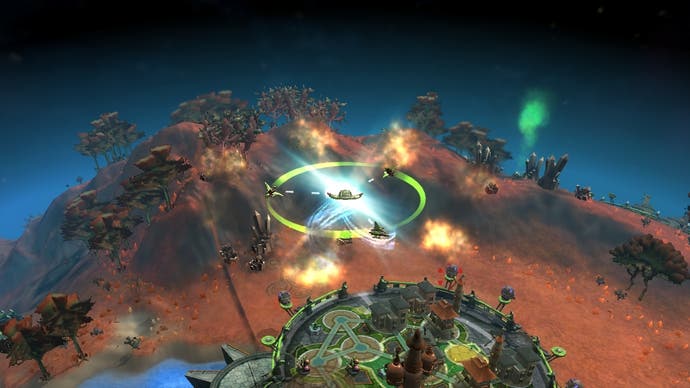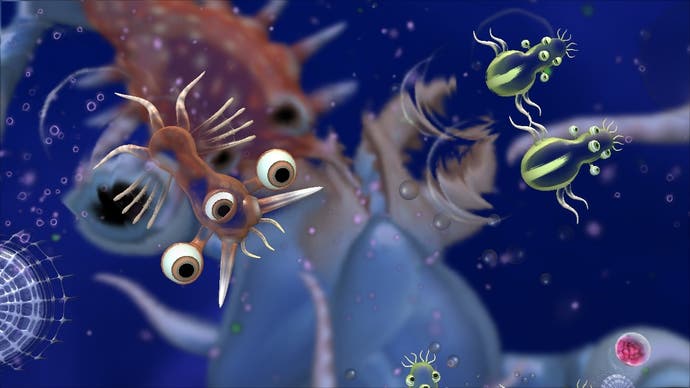Maxis' Will Wright
Spore, The Sims and what lies ahead.
I think that's more a property of me picking a topic I'm deeply, deeply interested in. If I had picked a topic I thought maybe would sell, but that I wasn't personally interested in, it would have been excruciating, but I'm just as enthusiastic about the topic and themes as I was when I started. At that point it's more just a matter of enjoying the process - really I've spent a similar amount of time on Spore as I did on The Sims.
I'd say that the social networking thing was one of the larger changes that happened during design. The technology stuff wasn't really that much of an impact. If we were designing a game that was going to be a bleeding edge first-person shooter on the PlayStation 3, then the time-to-market issues would have been much more critical.
Instead we were trying to design a game that would work on a number of different platforms, would look nice... the underlying problems we were dealing with were simulation level of detail, procedural animation and stuff like that, that were kind of more platform-agnostic, so the march of technology helped us a lot, mainly in terms of us being able to hit a lower minimum-spec platform.
Gamers kind of liked being this renegade group, and games were so complex that nobody would touch them, and that their parents hated them and all of that stuff. There's definitely this hardcore mentality from players when they see games, maybe the Wii or whatever, and they feel it's diluted what a game should be - it should be this hardcore experience where you're wearing your headphones and fragging your friends online.
But I think that's a good sign. It's great that games are breaking out of that niche, small, insular group.

In a couple of directions, yeah. On the game design side, we've put way too much emphasis on linear storytelling, embedding that in our games - when people talk about, 'what's the story in this game, and who are the characters?' - when inherently I think games should be a much more user-driven experience where the user is unfolding the story and we give them more creative opportunities. That's not to say that games shouldn't have stories, I just think the story should be the player's story, and find more ways to celebrate and promote that, rather than the game designer's story that you're imposing upon them.
I think the Hollywood thing is kind of natural, in that most new forms of creative media look back to what was their predecessor. So with radio, people were there performing live theatre into a microphone in early radio, but then eventually it went off and became its own thing: traffic reports, talk radio, whatever. Television, the same thing - with early TV people were doing radio plays into mics in front of the camera, until they eventually realised there was a lot more power in the visuals.
[With] games, the real power is in the interactivity, the player driving the experience. But initially, early games, once they had the graphics, were trying to be movie experiences: here's the beginning, here's the back story, and then you rescue the princess at the end. So I think games creatively are now getting enough surefootedness, and enough technology underneath them, to give the player that freedom.
I think the reason I was driven to what Spore ended up becoming is that there are a lot of games out there that were single-player experiences, unconnected. There were a lot of games that were massively-multiplayer experiences, and there was nothing between the two. Yet there's a really interesting space of hybrids between the two that Spore became, where you have a lot of players connected through content, but it's not synchronous: it's asynchronous interactions.
When you design a massively-multiplayer online game you have to bite off a lot of major design limitations, like nobody can pause the game, nobody can cheat, you usually have to pay a subscription. But the biggest benefit I saw from that was the possibility of having a collaboratively built world, that's huge and always surprising. So for Spore we tried to figure out, how do we get the best aspects of a massively-multiplayer game without all these huge design limitations?
I think a lot of these limitations were what sank The Sims Online: we didn't have enough user-created content; to a lot of the people that were playing The Sims, the idea of paying a subscription was a really big filter - a lot didn't even have credit cards. So really I think it's interesting that nobody's explored this hybrid space between the two, and that's the reason we ended up there with Spore. That's not to say that one day we might not do a massively-multiplayer online version of it, but it's just not the most interesting initial unveiling of it for me.

That era and the eras afterwards - I think that the internet basically gave a whole new dynamic to social change. Even in the '60s you basically had broadcasters and consumers, whether it be games, movies, news, whatever. When the internet came around and all of sudden you had this idea of peer-to-peer narrowcasting - everybody could be a producer, everybody could make their own blog, their own YouTube video. There's a huge shift in the dynamics of the way culture plays out and ideas. Mimetic warfare - the idea of memes competing for mindshare.
I think games as a similar technology alongside the internet bring in this idea of empowering the player to create things, and explore new experiences and craft imaginary models they can share with other people. I think those two things, taken together, give something like games their power - to actually go in and get people actively engaged in something that might actually transfer into an interest or a change in the perception of the world around them after they walk away from the game. But also become and avenue for them to craft messages, experiences, narratives, content, that now get freely shared with other players.








